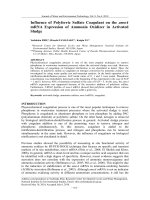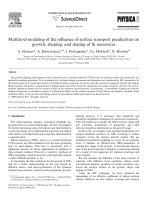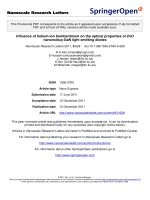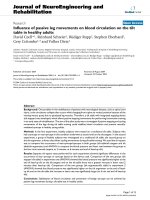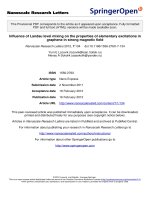The influence of the marketing concept on company performance
Bạn đang xem bản rút gọn của tài liệu. Xem và tải ngay bản đầy đủ của tài liệu tại đây (5.62 MB, 218 trang )
G
THE PENINSULA TECHNIKON
BUSINESS FACULTV
Mtech Thesis
THE INFLUENCE OF THE MARKETING CONCEPT ON
COMPANY PERFORMANCE WITH SPECIFIC
REFERENCE TO CUSTOMER SERVICES
WITHIN THE TRAVEL AGENCY INDUSTRY
IN THE WESTERN CAPE
MORNAY ROBERTS-LOMBARD
CAPE TOWN
SEPTEMBER 2001
A MASTERS DEGREE DISSERTATION
PRESENTED TO THE
DEPARTMENT OF MARKETING OF THE
BUSINESS FACULTY
AT
PENINSULA TECHNIKON
In fullIlment of the requirements
of the
Masters Degree in Technology:
Marketing
September 2001
by
M. Roberts-Lombard
Supervisor:
Mr. I.C. van der Heever (peninsula Technikon)
DECLARATION
I, the undersigned, hereby declare that the work contained in this thesis is
my own original work and has not previously in its entirety or in part been
submitted at any university or technikon for a degree.
SIGNATURE:
DATE:
ABSTRACT
Companies operating in the sel"Vlce industry must take note of three important
marketing tasks. The first of these tasks is that companies should realise that they
must provide the market with a variety of products. Businesses should therefore
furnish the market with a diversified product range. Secondly, customers expect from
the business sector to provide them with a quality service that even exceeds their own
expectations. Thirdly, to ensure its survival in a competitive environment, the
company should improve the productivity of its employees e.g. by improving the level
of customer service provided to customers. Kotler (1997: 488) argues that such an
improvement in productivity levels of employees can be achieved through employees
working more skilIfully, increasing the quantity of service by surrendering some
quality, industrialising the service, inventing new-product solutions, designing more
effective services, presenting customers with the incentive to substitute their own
labour for company labour, or using technology to save time and money.
Keeping these facts in mind and taking into consideration that tourists have been
arriving in South Africa from all over the world for decades, it is of great importance
for visitors to South Africa to receive customer service of the highest quality. A
tourist travelling in the Republic of South Africa will most probably make use of a
local travel agency if they should be in need of any further travel related services. A
travel agent representing a particular travel agency, will not be engaged in the sale of
travel related services only to tourists, but also to any other consumer interested in
making use ofthe Travel Agencies' services.
The Association of Travel Agents' (ASATA) code of conduct stresses that "ach travel
agent engaged in the sale of travel-related services direct to consumers shall maintain
the highest standard of service possible, complying "vith all statutory requirements,
including those applicable to travel agents and with all provisions of this code"
(Business Practices Committee Consumer Code For Travel Agencies, 1994: 5).
This thesis is an analysis of the "marketing concept", with specific reference to
customer service. It focuses on the top management in the travel agency industry and
will be concerned with the degree to which top management is marketing orientated
and the influence their marketing-orientated outlook will have on the performance of
the travel agency.
With marketing being defined as: "the process of planning and executing the
conception, pricing, promotion and distnbution of ideas, goods and services to create
exchanges that satisfY individual and organisational goals", it must be emphasized
that marketing can be seen as, amongst others, the anticipation and satisfaction of
customer needs (Boshoff & Terblanche, 2000: 4). This research study would also
include a study of the travel agency's level of customer service, which will have a
direct reflection on top management's marketing outlook as well as the travel agency's
level ofperformance.
ACKNOWLEDGEMENTS
My sincere gratitude to:
•
The travel agencies in the Western Cape who assisted me with useful
remarks which enabled me to complete this thesis;
•
Mr I. C. van der Heever, my supervisor, who provided meaningful
comments and guidance throughout the various stages of this demanding
task;
•
The people working within a well-known research company in Cape Town
for their support and constructive advice on the research project;
•
Lorenzo Himunchull of Peninsula Technikon's Educational Development
Centre whose assistance during the data analysis stage was of great benefit
to me;
•
Dr Edwin Heath of the Department of English, University of Stellenbosch,
for the proofreading of my thesis;
•
Me. Sus Niemand for the typing of the thesis and willinguess to assist me in
meeting my deadlines;
•
Mr. Andrikns van der Westhuizen, Campus director: Boland College
Stellenbosch, for his support, interest and encouragement during my studies;
•
My father, Japie Roberts and my best friend, Veronica Carstens, for their
constant understanding, patience and support;
•
God, for providing me with strength and courage to persevere. All praise to
you God, for your constant love, support and protection during every day of
my life.
Dedicated to two very special people:
My late mother, Sue Roberts and
My late brother, Byron Roberts.
Thank you for your love, support and for
always believing in me.
M. Roberts-Lombard
September 2001
CONTENTS
PAGE
Table of contents: Chapters 1 - 7
i-vi
List of figures
vu
List of tables
viii
List ofworksheets
ix
List of exhibits
x
List of Addendums
Xl
Text
1-181
Reference list
182 -185
..
.
CHAPTERl
PROBLEM IDENTIFICATION
PAGE
1.1
INTRODUCTION
2
1.2
BACKGROUND STUDY
5
1.2.1
BUSINESS DECISION MAKING PlllLOSOPHIES - AN
INTRODUCTION
5
1.2.2 THE MARKETING CONCEPT AND ITS LINK TO CUSTOMER
SERVlCE
1.2.3 RELATIONSHIP MARKETING -
6
AN INTRODUCTION
11
1.3
FORMULATION OF THE RESEARCH PROBLEM
12
1.3.1
SUB-PROBLEMS
12
1.4
HYPOTHESIS
13
1.5
DELIMITATION OF THE RESEARCH
13
1.6
RESEARCH METHOD
13
1.6.1 PRIMARY DATA
13
1.6.2 SECONDARY DATA
14
1.7
SIGNIFICANCE OF THE RESEARCH
14
1.8
OBJECTIVES OF THE RESEARCH
15
1.8.1 PRIMARY OBJECTIVES
15
1.8.2 SECONDARY OBJECTIVES
16
ii
1.9
RESEARCHER'S QUALIFICATIONS
16
1.10 INTENDED PROGRAM OF STUDY
16
1.10.1 OUTLINE OF CHAPTERS
16
1.10.2 TIME FRAME
17
1.10.3 BUDGET
17
1.11 GLOSSARY OF TERMS
17
1.12 SUMMARY
18
CHAPTER 2
DEFINITION AND mSTORICAL DEVELOPMENT OF
THE MARKETING CONCEPT
2.1
INTRODUCTION
20
2.2
AN INTRODUCTORY FOCUS ON THE MARKETING
CONCEPT
21
2.2.1
THREE FUNDAMENTAL INGREDIENTS TO THE MARKETING
-22
CONCEPT
2.3
mSTORICAL OVERVIEW OF THE DEVELOPMENT OF THE
MARKETING CONCEPT
29
2.4
THE EVOLUTION OF THE MARKETING CONCEPT:
A BACKGROUND STUDY
2.4.1
EVOLUTIONARY PERIODS IN THE DEVELOPMENT OF THE
MARKETING CONCEPT
32
ill
2.5
THE CONCEPTUAL CONSTRUCTION AND ACCEPTANCE
OF THE MARKETING CONCEPT
39
2.5.1
TIIE MARKETING CONCEPT HAD COME OF AGE
2.5.2 TIIE ADOPTION OF A MARKETING - ORIENTATED
PIDLOSOPHY
39
41
2.5.3 TIIE FACTORS THAT INFLUENCE TIIE ACCEPTANCE OF TIIE
42
MARKETING CONCEPT
2.6
PRACTICAL APPLICATION OF THE MARKETING
CONCEPT
43
THE ORIGIN AND ADOPTION OF TIIE MARKETING
CONCEPT
44
2.6.2 A SOUTH AFRICAN APPLICATION OF THE MARKETING
CONCEPT: TIIE SURE TRAVEL TRAVEL AGENCY GROUP
45
2.6.1
2.6.3
TIIE DEVELOPMENT OF THE MARKETING CONCEPT AND
ITS FOCUS ON CUSTOMER SERVICE
46
THE MARKETING CONCEPT - A PHILOSOPHY OF
MANAGEMENT
47
2.8
OPTIMISATION OF THE MARKETING CONCEPT
51
2.8.1
MARKETING CONCEPT RELATED RESEARCH
51
2.7
2.8.2 A DETAILED CRITIQUE OF THE MARKETING CONCEPT
2.9
2.10
52
THE ADVANTAGES AND DISADVANTAGES OF THE
MARKETING CONCEPT
53
SUMMARY
54
CHAPTER 3
CUSTOMER SERVICE IN PERSPECTIVE
3.1
INTRODUCTION
57
lV
3.2
33
THE MARKETING CONCEPT AND ITS COMPETITIVE
ADVANTAGE
58
CUSTOMER-DRIVEN BUSINESS STRATEGIES WITHIN
THE MARKETING CONCEPT
60
3.3.1
ADVANTAGES OF A CUSTOMER - ORIENTATED APPROACH 61
3.4
THE FOCUS OF THE MARKETING CONCEPT ON THE
STRATEGIC TARGETING OF THE CUSTOMER.
66
3.4.1 PRACTICAL GUIDELINES TO DELIVERING QUALITY
3.5
3.6
CUSTOMER SERVICE.
69
POWER SHlFTS TO THE CONSUMER BY MEASURING
CUSTOMER SATISFACTION.
73
SUMMARY
78
CHAPTER 4
RELATIONSHIP MARKETING
4.1
INTRODUCTION
81
4.2
THE MARKETING CONCEPT AND RELATIONSHIP
MARKETING
81
"SS
43
RELATIONSHIP MARKETING - A DEFINITION
4.4
THE PREMISS OF RELATIONSHIPS WITH FUTURE
AND CURRENT CUSTOMERS
86
45
THE GROWTH OF RELATIONSHIP MARKETING
89
4.5.1
A PRACTICAL APPROACH TO CUSTOMER RESEARCH
93
4.6
THE IMPliCATIONS OF A RELATIONSHIP MARKETING
STRATEGY FOR THE FIRM
96
THE PRIMARY RELATIONSHIP BETWEEN THE COMPANY
AND THE CUSTOMER
98
4.6.1
4.6.2 THE SECONDARY RELATIONSHIP BETWEEN THE
COMPANY AND ITS CUSTOMERS
100
v
4.6.3
4.7
A SUGGESTED SERVICE QUALITY - PROFITABILITY
RELATIONSHIP MODEL.
102
SUMMARY
104
CHAPTERS
PL~GOFE~llUCALSTUDY
5.1
INTRODUCTION
107
5.2
PRIMARY RESEARCH PROJECT
108
5.2.1
STATEMENT OF OBJECTIVES
108
5.2.2 THE RESEARCH PROCESS
109
5.3
113
SUMMARY
CHAPTER 6
RESEARCH RESULTS
6.1
INTRODUCTION
115
6.2
RESULTS AND DISCUSSION
116
6.2.1
SECTION A: DEMOGRAPHIC DATA
116
6.2.2
SECTION B: TRAVEL AGENCY FOCUS
120
6.2.3
SECTION C: UNDERSTANDING OF THE MARKETING
CONCEPT BY MANAGEMENT IN THE TRAVEL
AGENCY INDUSTRY (TRUE AND FALSE
QUESTIONS)
131
SECTION D: UNDERSTANDING OF THE MARKETING
CONCEPT BY MANAGEMENT IN THE TRAVEL
AGENCY INDUSTRY (RATING QUESTIONS)
141
6.2.4
6.2.5
SECTION E: IDENTIFICATION OF THE MARKETING
ORIENTATION TRAITS WHICH ARE
CHARACTERISTIC OF MANAGEMENT IN THE
TRAVEL AGENCY INDUSTRY IN THE WESTERN
CAPE
152
6.2.6
6.3
SECTION F: COMMUNITY INVOLVEMENT OF TRAVEL
AGENCIES IN THE WESTERN CAPE
160
SUMMARY
167
CHAPTER 7
SUMMARY, CONCLUSIONS AND
RECOMMENDATIONS
7.1
INTRODUCTION
170
7.2
SUMMARY OF CHAPTERS
170
7.3
LIMITATIONS
174
7.4
CONCLUSIONS
175
7.5
RECOMMENDATIONS
177
7.6
CUSTOMER SERVICE AND FUTURE TRENDS
180
vu
LIST OF FIGURES
FIGURE
TITLE
PAGE
2.1
The "old" marketing concept (1976)
21
2.2
The "new" marketing concept (1976)
22
2.3
The knowledge-based marketing concept
24
2.4
The IT-enabling marketing concept
25
4.1
Primary relationship between the firm and its
customers
97
4.2
Secondary relationships with stakeholders
100
4.3
Service quality - profitability relationship model
103
6.1 - 6.15
Figures relating to the analysis ofquestions on
the questionnaire
118 - 163
viii
LIST OF TABLES
TABLE
TITLE
PAGE
5.1
Travel agency sample
109
6.1- 6.45
Tables relating to the analysis of questions on
the questionnaire
149-194
]X
LIST OF WORKSHEETS
WORKSHEET
TITLE
PAGE
4.1
Calculate the costs ofreplacing lost
customers
94
x
LIST OF EXHIBITS
EXHIBIT
2.1
TITLE
The marketing concept
PAGE
27
LIST OF ADDENDUMS
ADDENDUM
TITLE
A.
Questionnaire on customer service within the travel
agency industry
B.
Cover letter to explain the objectives and advantages
ofthe research study to the managers oftravel agencies
in the western cape
c.
Travel agency questionnaire coding sheet:
September 2001
1
CHAPTER 1
RESEARCH PROBLEM
Calmness is a sign ofpower.
(Brooks)
2
1.1 INTRODUCTION
Marketing plays many different roles, but one important aspect relates to continuous
growth of economies and at the same time, ensuring the continuance of individual
standards of living. The determination of needs and wants, backed up by purchasing
power, must indicate how management is to deploy its scarce resources in an attempt
to maximise customer satisfaction.
Should the management of companies succeed in this, human welfare will be optimised
within the limitations of those available resources. If firms can think ahead and be able
to predict the future needs and wants of people, such firms may be able to implement
actions which will ensure the satisfaction of these needs.
The marketing concept is based on satis:fYing the needs of customers. It is for this
reason that the management of travel agencies in the Western Cape should understand
the environment in which their customers make their purchasing decisions. Such an
understanding could assist management in formulating marketing policies that could
have a positive influence on a fimis ability to generate profits.
When the marketing concept is adopted by a business, they also undertake futuristic
planning in an effort to forecast the needs of customers in the future as well as the
marketing environment in which such a company will be operating. What South Africa
needs is better service and lower prices. It would become more important for South
African companies to provide their clients with better quality services at declining
prices.
South Africa's economic entry into the world of globalisation as well as the country's
economic policy of free market trading will make way for an increase in foreign
competition in South Africa. Increased competition will benefit the customer, not only
regarding price, but also with reference to the quality of customer service rendered by
the company.
3
It was Clem Sunter from the Anglo American corporation who said that companies
who do not adopt the scenario of better service and lower prices, will eventually die
(Boshoff & Terblanche, 2000: 3). Phillip Kotler (1997: 433) defines the concept of
service as follows:"...services are intangIble, inseparable, variable, and perishable. As a
result, they normally require more quality control, supplier credibility, and
adaptability". He further argues that"any act or performance that one party can offer
to another that is essentially intangJ.ole and does not resuh in the ownership ofanything
can be looked at as a service."(Kotler; 1997: 488) The economy of America has
moved quite far in the direction ofa service economy. The marketing community in the
United States of America (USA) has shown an extensive interest in the marketing of
services and the challenges it involves.
Kotler (1997: 488) descnbed the responsibilities awaiting marketers
ill
the new
millennium as follows:
}>
Marketers must:
•
provide tangibility to intangibles;
•
increase the productivity ofservice providers;
•
increase and standardise the quality ofthe service provided; and
•
match the supply of services during peak and non-peak periods with market .
demand.
Service industries world-wide took much longer to adopt and apply the concepts of
marketing. It is of vital importance within the service industry to focus on both internal
and external marketing. Companies are starting to realise that they have to look at their
own employees as potential customers who expect the company they work for to
provide them, as customers, with only the best service possible.
Companies operating in the service industry must take note of three important
marketing tasks.
•
The first of these tasks is that companies should realise that they must provide the
market with a variety of products. Businesses should therefore furnish the market
with a diversified product range.
4
•
Secondly, customers expect from the business sector to provide them with a
quality service that even exceeds their own expectations.
•
Thirdly, to ensure its survival in a competitive environment, the company should
improve the productivity of its employees e.g. by improving the level of customer
service provided to customers.
Kotler (1997: 488) argues that such an improvement in productivity levels of
employees can be achieved through "employees working more skilfully, increasing the
quantity of service by surrendering some quality, industrialising the service, inventing
new-product solutions, designing more effective services, presenting customers with
the incentive to substitute their own labour for company labour, or using technology to
save time and money".
Keeping these facts in mind and taking into consideration that tourists have been
arriving in South Africa from all over the world for decades, it is of great importance
for visitors to South Africa to receive customer service of the highest quality. A tourist
travelling in the Republic of South Africa will most probably make use ofa local travel
agency if they should be in need of any further travel-related services. A travel agent
representing a particular travel agency will not be engaged in the sale of travel-related
services only to tourists, but also to any other consumer interested in making use of the
travel agencies' services.
The Association of Travel Agents' (ASATA) code ofconduct stresses that "each travel
agent engaged in the sale of travel-related services direct to consumers shall maintain
the highest standard of service possible,. complying with all statutory requirements,
including those applicable to travel agents and with all provisions of this
code"(Business Practices Committee Consumer Code For Travel Agencies, 1994: 5).
This thesis will be an analysis of the concept of "marketing", with specific reference to
customer service. It will focus on the top management in the travel agency industry
and will be concerned with the degree to which top management is marketingorientated and the influence their marketing-orientated outlook will have on the
performance of the travel agency.
5
WIth marketing being defined as "the process of planning and executing the
conception, pricing, promotion and distnbution of ideas, goods and services to create
exchanges that satisfy individual and organisational goals", it must be emphasised that
marketing can be seen as, amongst other things, the anticipation and satisfaction of
customer needs (Boshoff & Terblanche, 2000: 4). The research study would also
include a study ofthe travel agency's level ofcustomer service, which will have a direct
reflection on top management's marketing outlook as well as the travel agency's level
ofperformance.
1.2
1.2.1
BACKGROUND STUDY
Business decision making philosophies - An introduction
All business operations function under the guidance of some philosophy of business
decision making. Finns, for example, may be driven to maximise short-term profit,
even if it means that the firm gives up on its long-term growth. It may even be that
organisations feel so threatened by competitive firms that their focus becomes
defensive with survival as the only goal.
Examples include goals such as market share, market dominance, competitive parity
and so forth. Whilst the philosophies under which firms may operate are diverse, the
rigours of the marketplace allow only productive philosophies to exist for long. The
marketing concept is perhaps the best known philosophy of business decision making
which stresses customer orientation. The philosophy on which a firm base its decisions
is a matter ofgreat importance. The reason for this is that such a philosophy will, in the
long run, determine the fate of the firm. Should a firm, for example, adhere to the
marketing concept as its philosophy of doing business, and should the marketing
concept prove to be non-productive in the firm's marketing environment, the business
will most likely fuil.
6
Intuitively, it becomes important for the company to feel secure about its chosen
philosophy of doing business. It wants to know whether the philosophy it applies in
business is a productive strategy for competing in a given market.
1.2.2
The marketing concept and its link to customer service
The literature has paid extensive attention to the marketing concept over the decades.
Writers such as Kotler, Webster, KohIi and Jaworski have written much about the
marketing concept being a standard bearer for the marketing discipline.
The marketing concept is regarded by many as both a philosophy as well as a concept
of business operation. The marketing concept has a range of literature which is quite
broad, but from a conceptual viewpoint, it is straightforward. Van der Merwe (1974:
35-36) argues that a philosophy is a broad umbrella that governs the business life,
whilst a concept is a recognised way of operating within the climate that the
philosophy umbrella has set. Van der Merwe (1974: 30-31) also provides a review of
the literature on the marketing concept where three core themes are identified, namely,
•
customer focus;
•
coordinated effort and
•
profitability.
Most of the literature on the subj~t is aimed at the further development ofthe
marketing concept compared to examining the marketing concept in practice. This
research project will attempt to link an operational business concept and philosophy to
results in actual business practice. According to the theory where the technique of
observation would appear to confirm a link to desirable performance, there remains no
substitute for empirical testing. The groundwork for further investigation into the link
between customer service and the marketing concept has been laid dO\\TI by Kotler,
thirty years ago when a "new marketing concept" was presented by him. "The 'old
concept', later knO\\TI as the selling concept, defined marketing as: 'The performance
of business activities that direct the flow of goods and services from producer to
consumer or user'. The new concept assigned a customer-orientated focus and defined
7
marketing as: 'the analysing, organising, planning and controlling of the firm's
customer-impinning resources, policies and activities with a view to satisfYing the
needs and wants of chosen customer groups at a point'. This is known as the
marketing concept" (Brannback, 1997: 294).
According to Chang & Chen (1998:249) market orientation is:
•
the generation ofmarket intelligence throughout the organisation which pertains
to current and future customer needs;
•
intelligence dissemination across departments and
•
the response to it by the organisation.
The marketing concept, as currently defined in the marketing literature, holds that
organisational success " depends on determining the needs and wants of the target
market and delivering satisfaction (to those markets) more effectively and efficiently
than competitors do" (Kimerey & Rinehart, 1998: 118). The core of the marketing
concept is the enterprises' dependency on the goodwill and satisfaction of its
customers. The customer will become the focal point for company functions such as
planning, strategy setting, research, product development as well as marketing
activities.
The Association of Travel Agents' Code of Conduct (Business Practice Corrnnittee
Consumer Code for Travel Agencies, 1994: 5) underlines the importance of honesty,
quality and professionalism in the Travel Agency Industry through specified principles.
Quality service delivery encompasses characteristics such as honesty, quality and
professionalism and is underwritten in the Code of Conduct through the following
principles:
•
"when complaints are directed to it, the Business Practice Corrnnittee(the
Committee) will have regard to the provisions of the Code in assessing whether
conduct complained of constitutes a harmful business practice, irrespective of
whether the travel agent involved is a member of the Association of South African
Travel Agents and

